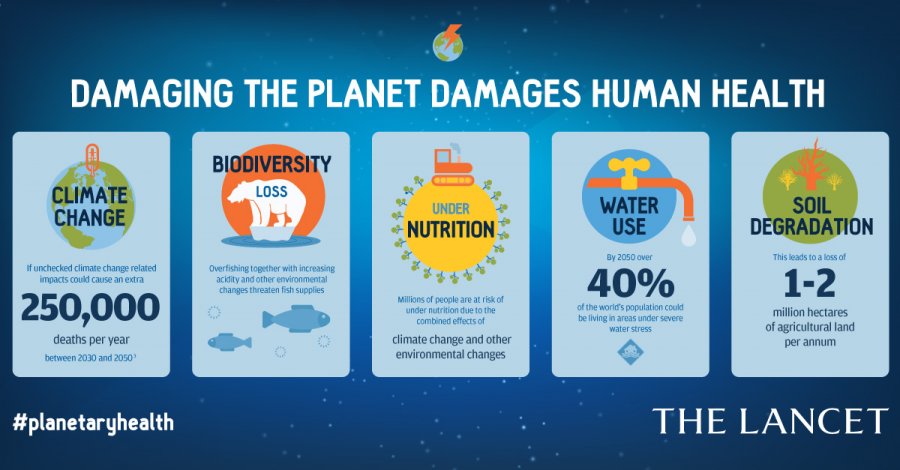Earth and health under threat from human activities
16 July 2015 London School of Hygiene & Tropical Medicine London School of Hygiene & Tropical Medicine https://lshtm.ac.uk/themes/custom/lshtm/images/lshtm-logo-black.png
A new report released by The Rockefeller Foundation-Lancet Commission on Planetary Health, calls for immediate, global action to protect the health of human civilisation and the natural systems on which it depends. The report provides the first ever comprehensive examination of evidence showing how the health and well-being of future generations is being jeopardised by the unprecedented degradation of the planet's natural resources and ecological systems.
The report was written by a Commission of 15 leading academics and policymakers from institutions in eight countries, and was chaired by Professor Sir Andy Haines of the London School of Hygiene & Tropical Medicine. It demonstrates how human activity and development have pushed to near breaking point the boundaries of the natural systems that support and sustain human civilisations.
Prof Haines said: "We are on the verge of triggering irreversible, global effects, ranging from ocean acidification to biodiversity loss. These environmental changes - which include, but extend far beyond climate change - threaten the gains in health that have been achieved over recent decades and increase the risks to health arising from major challenges as diverse as under-nutrition and food insecurity, freshwater shortages, emerging infectious diseases, and extreme weather events."
The Commission warns that a rising population, unsustainable consumption and the over-use of natural resources will exacerbate these health challenges in the future. The world's poorest communities will be among those at greatest risk, as they live in areas that are most strongly affected and have greater sensitivity to disease and poor health.
The report, Safeguarding Human Health in the Anthropocene Epoch, outlines a range of beneficial policies and actions that can be taken by governments, international organisations, researchers, health professionals and citizens that are good for both health and the environment.
Examples include benefits from reduced air pollution, healthy diets with more fruit and vegetables, active transport (walking and cycling), reduced urban heat stress from green spaces, and increased resilience to coastal flooding from intact wetlands and mangroves. In addition, the report identifies some major gaps in evidence and the research that is needed.
Some of the recommendations include:
- Integrated social, economic and environmental policies: Policies and initiatives need to be designed to promote more efficient use of current resources to allow for the replenishment of natural systems. They should also spur innovation and make sustainable practices more mainstream, such as reducing waste and developing resilient cities.
- Better governance: Leaders need to take initiatives to reduce the risks to health and vital ecosystems, and implement policies to reduce subsidies that block sustainable practices, encourage behavioural change, incentivise the private sector, support research, and promote public discourse. To help ensure that Planetary Health is at the centre of national policy, governments should give responsibility for monitoring trends and developing policies to a body that answers directly to the Head of State.
- Improved health systems: Environmental health needs must be integrated into health budgeting and purchasing. In addition, as environmental threats will be characterised by surprise and uncertainty, health systems must be designed for resilience, planning for potential risks and adapting quickly to meet challenges and restore services.
- A reorganisation and expansion of our knowledge on Planetary Health: There are substantial gaps in knowledge that can be closed with the expansion of research, improved understanding of the links between health and environmental change and potential adaptation strategies, building integrated surveillance systems and reporting on progress nationally and internationally.
Publication:
- Sarah Whitmee, Andy Haines, Chris Beyrer, Frederick Boltz, Anthony G Capon, Braulio Ferreira de Souza Dias, Alex Ezeh, Howard Frumkin, Peng Gong, Peter Head, Richard Horton, Georgina M Mace, Robert Marten, Samuel S Myers, Sania Nishtar, Steven A Osofsky, Subhrendu K Pattanayak, Montira J Pongsiri, Cristina Romanelli, Agnes Soucat, Jeanette Vega, Derek Yach. Safeguarding human health in the Anthropocene epoch: report of The Rockefeller Foundation-Lancet Commission on planetary health. The Lancet. DOI: 10.1016/S0140-6736(15)60901-1
Our postgraduate taught courses provide health practitioners, clinicians, policy-makers, scientists and recent graduates with a world-class qualification in public and global health.
If you are coming to LSHTM to study a distance learning programme (PG Cert, PG Dip, MSc or individual modules) starting in 2024, you may be eligible for a 5% discount on your tuition fees.
These fee reduction schemes are available for a limited time only.